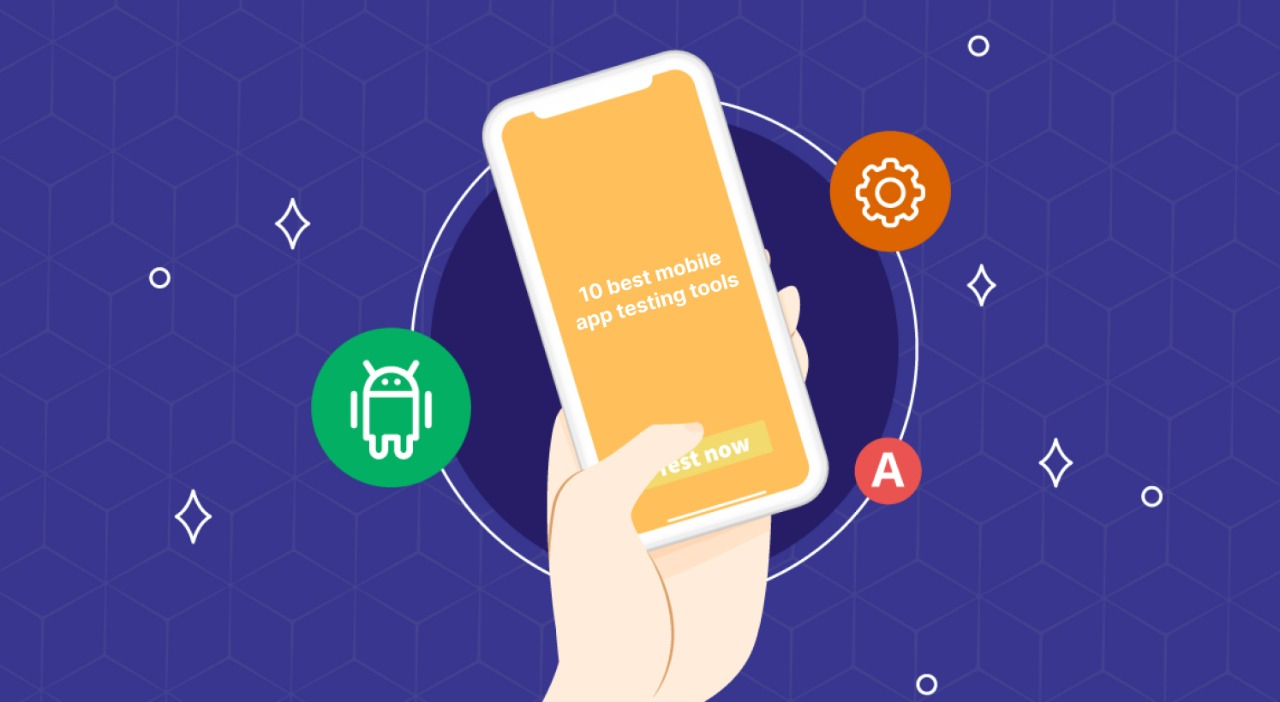The Mobile app testing strategy revolves around the use of various modern tools. You can avail of several methods and affordable mobile app testing tools for implementing your mobile app testing practices. If you are limited on time and money for getting your mobile apps tested, then this article is for you.
The mobile domain is increasing as many App testing services are successfully working on it. Mobile Applications presently include all types, from video to mobile banking apps.
Testing mobile apps are quite a complex process, and a mobile app development company will guide you on those grounds. There are numerous platforms and Operating Systems, types of testing scenarios, and various network connections and carriers in the picture for mobile applications.
Mobile App Testing
Mobile Application Testing is the process in which applications designed and developed for mobile devices are tested for their functionality, consistency, and usability. If you are a beginner in mobile test automation, you could always start practising with any apps. You will soon master the script creation and testing execution aspects with a bit of guidance.
Suppose you are willing to take the mobile app testing aspects into your hands. In that case, we suggest using any of the above mobile performance testing tools to get the best results, improve application performance, and experience better responses.
App Testing Tools
Here are the ten Best Mobile App Testing Tools that can assist you in handling and implementing your mobile app testing strategies.
1. Apptim
Apptim gives you a quick and detailed performance overview of your app. It quickly tests iOS and Android apps without installing SDKs or changing code. Apptim lets you analyze the performance of iOS and Android apps while running them on real devices.
You can generate detailed reports on app render time, power consumption, resource usage, crashes, errors, and more and share the reports with your team’s private workspace. Testing apps on real devices rather than emulators sometimes requires changing the app’s code or installing heavy software development kits that may affect performance.
It’s an easy-to-set-up, lightweight tool that lets you get started quickly without making significant changes to your app. Apptim integrates with Jira, allowing you to publish and track the bugs you find directly in your project management tool.
2. BrowserStack
A cross-browser solution for testing mobile apps and websites at scale BrowserStack provides manual and automated mobile testing at scale.
When testing your app on a wide range of real devices, it’s hard to beat BrowserStack. The cloud-based solution allows for testing on 3000+ real devices and browsers. BrowserStack is a powerful solution that runs over two million daily tests across 15 global data centres.
BrowserStack offers two types of mobile app testing. They are app Live and app automate. App Live lets you interact naturally with a remote device like you would one in your hand. You can use the app in real-world conditions and inspect and debug your app as you go. App Automate lets you speed up your test cycles by running concurrent tests across thousands of devices.
BrowserStack’s most popular integrations include Selenium and Jenkins. It also integrates with a long list of CI/CD solutions, automation frameworks, and other tools.
3. Test Project
Free, community-based end-to-end testing for web, mobile, and API apps
TestProject offers an intuitive step recorder that anyone can use. As an open-source app, TestProject has 1,500+ community-generated add-ons that can be used to extend the tool’s capabilities and integrations.
TestProject is an open-source tool built on Appium and Selenium that offers codeless testing for Android and iOS apps. It is easy for anyone to use. For example, you can create tests simply by interacting with your mobile app.
Every step you take is recorded and automatically turned into an ordeal. If you want to get into more advanced test creation, you can export your recorded tests as code so that your developers can extend or customize them.
4. Eggplant
Eggplant’s low-code, UI-driven mobile testing is easy for any team to use.
It is an easy-to-use tool for testing UX across web, desktop, and mobile applications. User reviews of this solution consistently rave about its usability for beginners and expert testers.
Eggplant uses machine learning to shift from manual to automated testing, facilitating a rapid release cycle. Continuous testing and compatibility checks help you eliminate errors and inconsistencies before the app is released to production. Eggplant offers integrations with CI/CD tools, including Jenkins, Bamboo, GitHub, and more.
5. BitBar
BitBar offers mobile performance testing for cloud and local devices.
Formerly known as CrossBrowserTest, BitBar offers live cloud-based testing, automated cloud-based testing, and local device testing. BitBar is framework agnostic, making it flexible and future-proof.
When testing an unreleased app on local devices, you might worry about protecting your data and credentials and hiding new features. BitBar can help with this by using its SecureTunnel feature to connect to your application, whether behind a firewall, on a proxy server, or plain HTML/CSS/JavaScript files on your local machine.
6. Perfecto
Perfecto offers both scripted and scriptless mobile app tests. It is Cloud-based continuous testing with scriptless self-healing capabilities. Perfecto has an impressive list of integrations, including IDEs, continuous integration tools, and test automation frameworks.
Perfecto is a cloud-based solution that lets you automate web and mobile app testing with both code and codeless options. It’s one of the more robust tools for finding every possible defect, as it offers detailed information from dashboards, heatmaps, videos, screenshots, and crash logs across various devices.
A common obstacle to testing apps at scale is the fragility of test automation scripts. Scripts can break due to changes to the UI, a lack of maintenance, incorrect testing frameworks, and more. Perfecto’s self-healing algorithm automatically updates the testing flow so that you can keep testing without devoting resources to fixing the test script.
7. Appium
Appium’s flexibility makes it the most popular framework for mobile app testing. It is a flexible test framework for iOS and Android mobile app testing. Rather than a mobile app testing platform like most others on this list, Appium is an open-source framework for automating native, mobile web, and hybrid applications on iOS, Android, and desktop. Its flexibility and scalability make it a popular method for automating mobile app testing.
Unlike some of the other commonly-used test frameworks, Appium offers cross-platform compatibility, allowing you to run the same tests on multiple platforms. The tester can do this without modifying or recompiling the app under test. It’s also compatible with real-device testing and emulators. With built-in UI automation, Appium can produce detailed information logs and reports for robust analysis and debugging.
8. Kobiton
Kobiton lets you access hundreds of devices for automated and manual testing. It has Speedy automated testing on 350+ real mobile devices.
Kobiton is a mobile app testing platform that’s great for fast manual and automated testing. You can quickly and easily perform functional, performance, and visual tests using Kobiton’s scriptless solution.
Testing your app on various real devices is the best way to replicate the user experience. But you might not have the resources to buy enough test phones or the time to try on each mobile device. Kobiton lets you run tests on a farm of 350+ real iOS and Android devices in the public cloud. You can also use it to test on your own devices.
9. Ranorex Studio
Ranorex Studio offers reliable identification of elements in your app's UI. It is a Powerful cross-platform GUI testing for desktop, web, and mobile apps. Ranorex Studio is one of the market's most robust solutions for cross-platform testing.
A single Ranorex Studio license lets you run automated tests across various legacy and modern systems. For Android and iOS, Ranorex supports testing on both real devices and emulators. Ranorex has a feature set worthy of expert users, but the ability to create tests with a simple drag-and-drop UI makes it suitable for beginners. It's known for its object identification capabilities. For instance, the Ranorex Spy tool identifies and analyzes all types of objects, including dynamic UI elements.
Ranorex's many integrations include Jira and Bugzilla for issue management, TestRail and TestShell for test management, and Azure DevOps and Jenkins for build and release management.
10. Headspin
HeadSpin offers location-based performance testing on thousands of devices. It is an AI-based geolocation and performance testing tool with thousands of devices.
HeadSpin is a mobile app testing tool that allows users to remotely test and debug mobile, web, audio, and video applications on thousands of devices and operating systems. You can test the app in multiple scenarios and easily see any differences.
For many app developers, testing an app on various new and old Android and iOS devices isn't enough - you have to make sure the app works well worldwide. HeadSpin is an excellent tool for testing apps globally, thanks to its geolocation testing. This test covers the app against geography-dependent factors like data bandwidth and network infrastructure.
HeadSpin's integrations include automation frameworks like Appium and Selenium, CI/CD tools like Azure and Jenkins, and Jira.

















Post Comments